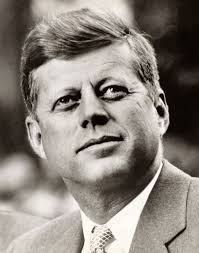Lecture Date: October 20, 2020

Several years ago a national survey asked respondents to name whom they regarded as the greatest American President. John F. Kennedy was voted number one, ahead of such consensus giants as Washington, Lincoln, and Franklin D. Roosevelt.
Well, . . . uh. . . no.
It is safe to say that most historians today would not endorse such a roseate view of the 35th President.
Surely Kennedy was in many respects a beguiling figure: the handsome scion of a prominent New England family, he inherited both wealth and political pedigree. Having graduated from Harvard, he became a naval hero in World War II, followed by election to the House of Representatives in 1946 and the U.S. Senate from Massachusetts in 1952. He also authored two well-received books and married a glamourous socialite, Jacqueline Bouvier.
In the presidential election of 1960, he defeated incumbent Vice President Richard Nixon by one of the narrowest margins in history, significantly abetted by his performance in the first-ever televised presidential debates, thereby becoming the youngest president ever elected.
The country thrilled to his soaring inaugural address in which he memorably exhorted Americans to “ask not what your country can do you for. Ask what you can do for your country.”
And so, to many it seemed that a new “Camelot” was indeed at hand. With its grandeur and glamour, its elegance and its eloquence, it seemed almost too good to be true.
It was.
It did not take long for Camelot’s luster to tarnish. Almost immediately foreign problems arose, particularly in Cuba, culminating in the missile crisis of 1962 -- generally deemed to have been America’s closest brush ever with a nuclear attack.
Meanwhile, the New Frontier’s domestic program languished. To be sure, there were some notable developments, including establishment of the Peace Corps, creation of the man-on-the-moon program, and the signing of the Nuclear Test Ban Treaty with the Soviets. Yet, neither of Kennedy’s two pet projects, Medicare and federal aid to education, were enacted; nor was there much legislative progress in the area of civil rights.
Then came the horrifying events of November 22, 1963 in Dallas.
Immediately after the assassination, Kennedy was cast as a martyr-- elevated by many to a heroic status far beyond what the tangible evidence would sustain. (This was a particular irony inasmuch as he himself once commented that “the true measure of presidential success is concrete achievement.”)
But presently, and predictably, the raptors of revisionism descended, pecking away at his theretofore sacrosanct legacy. The revisionist critique was broadly based on the contention that his presidency amounted to the triumph of style over substance -- that the glitter of Camelot masked the lack of any real accomplishment. As one wag commented, the rocking chair (which he used for his painful back) was the perfect symbol for the Kennedy presidency because “it gives the impression of constant motion without ever going anywhere.”
With the passage of time, criticism came to focus on more specific concerns, among them: the charge that under his administration the CIA had been involved in foreign assassination plots; that he may have been addicted to painkillers; and that he was a profligate womanizer, including the persistent rumor of an affair with Marilyn Monroe. (Certainly in one well-documented case -- his affair with Judith Campbell Exner -- the allegations were doubly damning, as she was also linked with high-ranking mafia bosses.)
And yet, revisionist criticism notwithstanding, the Kennedy image still shines brightly for many Americans. Why so?
Part of it relates to Kennedy’s own comment that “personalities have always been more interesting than facts.” And interesting he doubtlessly was -- possessing the charisma, one writer quipped, “to make the smart folk laugh, the poor folk hope, and the women folk faint.”
Another factor involves the changing American zeitgeist. As one journalist expressed it: “He was the last president the American people looked up to -- the last leader in a time when Americans were eager to follow.”
And so, from today’s vantage point, does Kennedy deserve to be considered a great President?
Though certainly he was no saint in his personal life, and showed significant shortcomings in his political career, he nonetheless had the ability to instill courage and to inspire hope. Thus, even though he did not meet his own expressed standard of greatness -- “concrete achievement” -- there are many who contend that he possessed sufficient intangible characteristics of leadership to warrant our admiration. In that light, his greatest achievement seems to have been in his transformation of the American spirit -- his re-awakening of the American dream.
In the process, Kennedy’s contributions transcended the palpable accomplishments by which greatness is often judged. And thus he remains now, as he was then: a symbol of the promise of America.
Published in the Free Lance-Star October 17, 2020
Speaker: William B. Crawley
UMW Professor Emeritus of History
Director of Great Lives